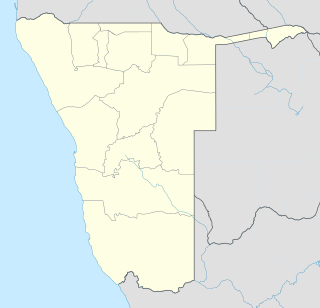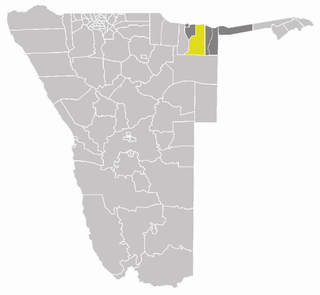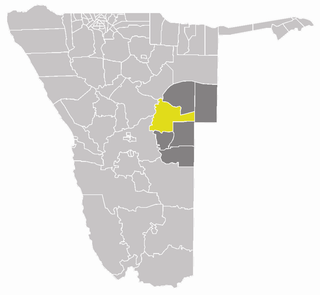
Mukwe is a constituency in the Kavango East region of Namibia. It has 26.000 inhabitants, [1] the district centre is the settlement of Mukwe.

Kavango East is one of the fourteen regions of Namibia. Its capital is Rundu. Because of its rather higher rainfall than most other parts of Namibia, this region has agricultural potential for the cultivation of a variety of crops, as well as for organised forestry and agro-forestry, which stimulates furniture making and related industries.

Namibia, officially the Republic of Namibia, is a country in southern Africa. Its western border is the Atlantic Ocean; it shares land borders with Zambia and Angola to the north, Botswana to the east and South Africa to the south and east. Although it does not border Zimbabwe, less than 200 metres of the Zambezi River separates the two countries. Namibia gained independence from South Africa on 21 March 1990, following the Namibian War of Independence. Its capital and largest city is Windhoek, and it is a member state of the United Nations (UN), the Southern African Development Community (SADC), the African Union (AU), and the Commonwealth of Nations.
Contents
The constituency contains the major settlements of Bagani, Kangongo and Divundu, and a number of small populated places such as Andara and Diyogha.

Bagani is a settlement on the south-western banks of the Okavango River in the Kavango East Region, Namibia, 200 kilometres (120 mi) east of Rundu and near the Popa Falls on the Okavango River. Bagani has a population of around 2.000 inhabitants and is homestead of the local Mbukushu kings.

Kangongo is a settlement on the Eastern banks of the Okavango River in the Kavango East Region, Namibia, 140 km east of Rundu along the Trans-Caprivi Highway. Kangongo has a population of around 3500 inhabitants.

Divundu is a village on the south-eastern banks of the Okavango River in the Kavango East Region, Namibia, 200 kilometres (120 mi) east of Rundu. Divundu has a population of around 5,430 inhabitants and is homestead of the local Mbukushu kings.
There is a bilateral agreement with Angola to allow mutual near-border immigration without travel documents. This applies to a maximum distance of 30 km, it is not valid for tourists.[ citation needed ]

Angola, officially the Republic of Angola, is a west-coast country of south-central Africa. It is the seventh-largest country in Africa, bordered by Namibia to the south, the Democratic Republic of the Congo to the north, Zambia to the east, and the Atlantic Ocean to the west. Angola has an exclave province, the province of Cabinda that borders the Republic of the Congo and the Democratic Republic of the Congo. The capital and largest city of Angola is Luanda.













